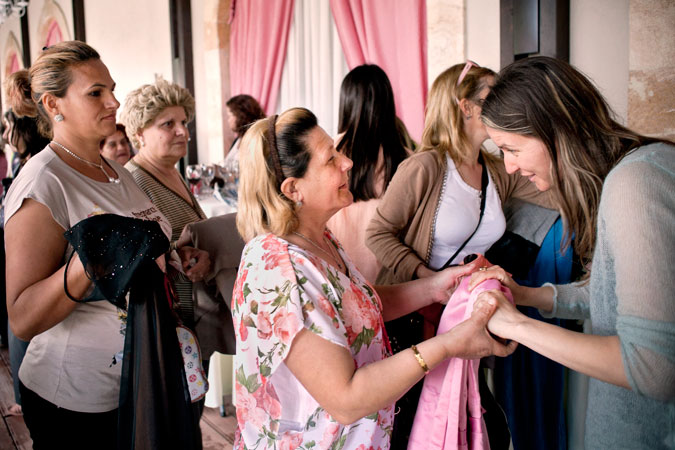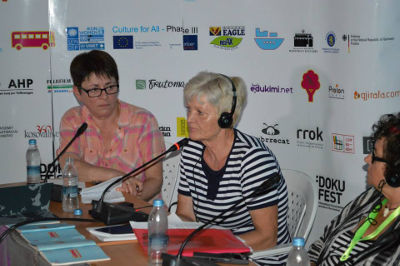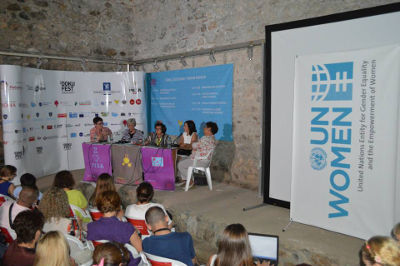Survivors of conflict-related sexual violence speak out in Kosovo – and get Government action
As the UN Security Council marks the 15th anniversary of the landmark UN Security Council Resolution 1325, we showcase how survivors of conflict-related sexual violence in the Western Balkans come out of the shadows and speak out against human rights violations of women in conflict.Date:

“I am one of thousands of women raped during the aggression,” said Ms. Bakira Hasečić, President of the Association of Women Victims of War, a civil society organization that provides support to the survivors of conflict related sexual violence in Bosnia and Herzegovina. “[After the war], I would see every day the killers and rapists. People who had done the worst things were still in the police. We created an association to wake people up and give our voice and power to other survivors.”

She was speaking on the sidelines of the International Documentary and Short Film Festival DokuFest in Kosovo[1], where UN Women organized a screening of Mission Rape: A tool of war, a gripping film about conflict related sexual violence in Bosnia and Herzegovina and survivors’ on-going fight for access to justice. Ms. Hasečić is one of the survivors portrayed in the film.
“Enabling access to justice for survivors depends on finding women willing to speak out and give evidence about the war crimes that happened to them,” said Ms. Hasečić, who remains undeterred despite the low number of successful prosecutions and convictions of conflict-related sexual violence in Bosnia and Herzegovina.
“I will fight with all those women as long as I am alive and until everyone who has done these things will be in jail,” she added.
Breaking the silence of survivors of sexual violence in conflict is an important first step.
For the survivors from Kosovo, Ms. Hasečić serves as a role model as many survivors are not ready to speak out on public events on the issue.
“The birth of my words is the death of my agonies,” said Ms. Veprore Shehu from Medica Kosova, a UN Women-supported NGO in Kosovo who provides survivors of sexual violence psychological and judicial support. “We had to break the silence to get support from the whole society.”
Survivors of conflict-related sexual violence remain stigmatized in the Western Balkans, and a culture of shame and silence surrounds the issue.
“However in Kosovo, significant advancements regarding the situation of survivors of sexual violence in conflict have been made since the beginning of 2014,” said Ms. Flora Macula, Head of the UN Women office in Kosovo. “In January 2014, the government approved an Action Plan on Implementation of UNSCR 1325 and committed to cover 51% of its budget,” added Ms. Macula.

The Plan, developed with the support of UN Women, aims to provide redress to survivors of conflict related sexual violence.
Recently, authorities in Kosovo introduced legislation recognizing survivors of sexual violence as civilian victims of war and the details in how they can access reparations and have access to justice are being finalized. The National Council on Survivors of Sexual Violence during the war in Kosovo leads this process with support from UN Women and other women’s rights organizations. The Council is a coordination body established by the President in 2014, that consists of representatives of key ministries, civil society and international stakeholders, such as UN Women, to better coordinate psychosocial and health treatment, access to justice, legal recognition, economic empowerment and awareness-raising.
“The National Council pushed many things in one and a half years that we as civil society would have needed 15 years for. The President gathered all people at one table to act together as one,” said Ms. Igballe Rogova, Executive Director of Kosova Women’s Network during the debate.
This week, the UN Security Council marks the 15th anniversary of the landmark UN Security Council Resolution (UNSCR) 1325. Adopted on 31 October 2000, UNSCR 1325 recognized for the first time, the role of gender equality and women’s leadership in international peace and security.
One of UN Women’s key guiding resolutions, UNSCR 1325 came to force as NGOs and the international community in the 1990s reacted to widespread sexual violence in civil wars in the former Yugoslavia, Rwanda and West Africa. More than 15 years after hostilities ceased in 1999, Kosovo is still undergoing post-conflict transformation.
[1] All references to Kosovo shall be understood to be in the context of Security Council Resolution 1244 (1999)